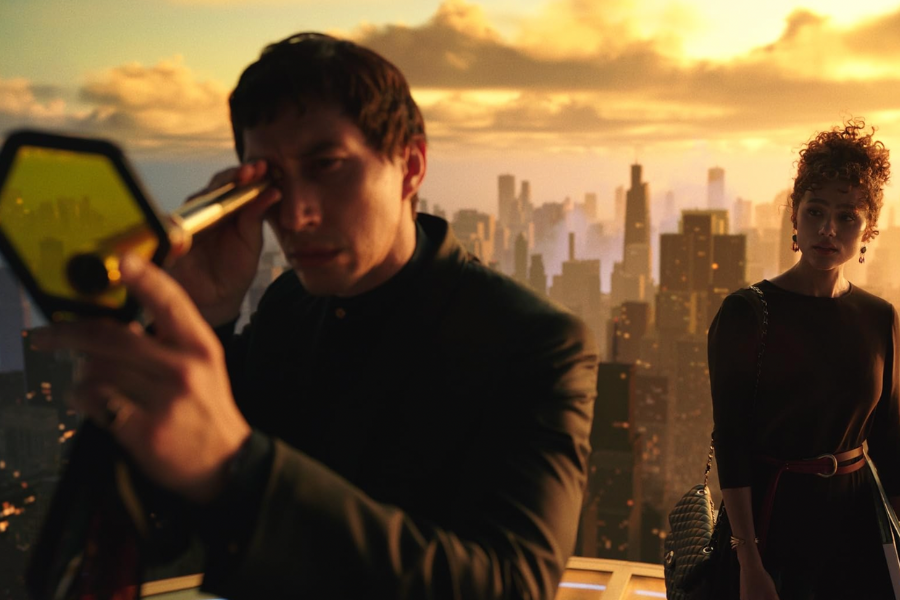If Francis Ford Coppola had TikTok in 2023, he’d tell you he’s been thinking about the Roman Empire for over 40 years — a thought that’s cost him over $120 million out of his own pockets. Coppola sold his Sonoma County wineries in 2021 in order to finance “Megalopolis,” his midlife crisis disguised as a feature film about the parallels between the ancient Roman Empire and our modern American society.
It would’ve been much cheaper — and more enjoyable — for him to make a TikTok instead.
“Megalopolis” reimagines this millennium’s New York City as New Rome, which is doomed to fail like the ancient empire. The Empire State serves as a backdrop for an ideological struggle between Cesar Catilina (Adam Driver), a Shakespeare-reciting, Nobel Prize-winning utopia architect who can — for whatever reason — stop time, and Franklyn Cicero (Giancarlo Esposito), the complacent mayor who’d rather turn demolished apartment complexes into casinos. Cesar flaunts the miracle material, Megalon, throughout the film — his new shape-shifting metal that can both build schools and fill bullet wounds. Cesar’s desire to use Megalon to build his dream city Megalopolis causes him to butt heads with Cicero, who’s too busy funding extravagant fashion shows in the street or appearing at Madison Square Garden’s weird chariot races to care about his failing city. It seems Coppola’s made it clear who deserves the audiences’ sympathies.
The runtime battles between grandiose speeches about a “great debate” over the future of New Rome and a random love affair between Cesar and the mayor’s daughter, Julia (Nathalie Emmanuel). Shia LaBeouf’s fascist Clodio further confounds the story, rising to popularity among plebeians while in drag. The film feels like an unintentional reflection of modern American culture and its absurdities. Even the hero, Cesar, has moments reminding us that he too is an agenda-pushing politician who mastered the art of appearance maintenance. He’s in bed with the seemingly only broadcast journalist in New Rome, Wow Platinum (Aubrey Plaza) in the beginning of the film, and wears cocaine on his nose like it’s an accessory while spinning out fist-first in hallucinogenic montages.
“Megalopolis” is at its best in these moments, where you can laugh at the out-of-touchness of the patrician main ensemble while simultaneously making a mental list of real-life politicians that sound like them. Characters quoting Ovid and speaking Latin, then turning around and saying the “big three” is “economics, journalism and sex appeal” feels very in-tune with the current lack of decorum in American politics — something Coppola admitted influenced his intentions at a special press conference and screening for New York Film Festival.
“Today, America is Rome, and they’re about to go through the same experience for the same reasons that Rome lost its republic and ended up with an emperor,” Coppola said at the NYFF press conference.
This cryptic warning about the parallels between ancient Rome and modern America could be applied to Coppola’s one-dimensional depiction of women in “Megalopolis.” Julia loses her spunk by the second act, when her character is limited to being Cesar’s mouthpiece and child-bearer. 16-year-old pop star Vesta (Grace Vanderwaal) sits on a giant moon to sing a ukulele song about her chastity vow — and her sex tape is leaked immediately after. And Wow — who has every male authority entangled around her finger and in her bed — is reduced to a villain for her power plays, while the so-called “womanizer,” Cesar, is lauded, even after his involvement in multiple affairs. It’s ironic that the only use for women in “Megalopolis” is being an object for the men in power to toy with or resent, given that Coppola was under fire in July for admitting to kissing young women on the film’s set, and for casting actors Shia LaBeouf and James Franco, who faced backlash following allegations of sexual misconduct and abuse against them. For a film about the future, Coppola’s views of female characterization — and women in the industry — hasn’t shifted beyond the ‘80s when he started dreaming up “Megalopolis.”
In all its narrative grandeur, “Megalopolis” never manages to produce a nuanced commentary on the dangers of factions and political polarization. The most it offers are random voiceovers of Cicero reading stone tablets stating the obvious: that our priorities should rest on our children and the future, and that we’re towing the line between a republic and a tyrant-led empire. With its steep production budget and inability to further the conversation surrounding political greed, Coppola’s “Megalopolis” ends up as out-of-touch as its characters.
“Megalopolis” is now showing in theaters everywhere.
Contact Dani Biondi at [email protected].

























































































































































